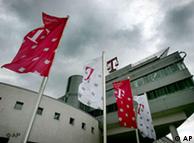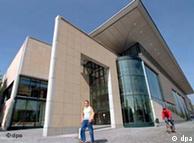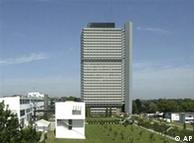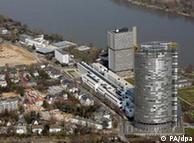Cities | 03.10.2007
Once the Jilted Bride, Germany's Former Capital Blossoms
When the federal government decided 16 years ago to move the capital of unified Germany to Berlin, Bonn seemed destined to sink into insignificance. But it has beaten most expectations and become an urban success story.
It was late on June 20, 1991, when Bonn got the blow that most thought would seal the city's fate. Parliamentarians had been debating whether to move the federal capital back to Berlin from the small city on the Rhine that had hosted the government since 1949 and were about to vote. Opposition to moving back to Germany's previous capital had been vocal and Bonn residents thought that in the end, parliament would decide to stay.
But at 9:47 p.m., Bundestag President Rita Süssmuth announced that parliament had voted 337 to 320 to pack up and move to Berlin. According to Dorothea Voigtländer, a journalist and author who was in the crowd that had gathered in Bonn's main square to follow the proceedings on a large screen, people were shocked into silence and the tears immediately began to fall.
 Bildunterschrift: Großansicht des Bildes mit der Bildunterschrift: A poster criticizing the government move to Berlin reading "Berlin Republic? No Thanks!"
Bildunterschrift: Großansicht des Bildes mit der Bildunterschrift: A poster criticizing the government move to Berlin reading "Berlin Republic? No Thanks!"
"All you could hear were raindrops on the roofs, as if the sky were crying with us," she said. "People said it was the city's death blow and thought it would sink back into anonymity."
Before 1949, the year the nascent West German government voted to make Bonn the provisional capital, Bonn had been a pleasant, but unremarkable small city. After it was catapulted to a new level, residents soon got used to the fringe benefits that came with international fame -- visits from luminaries like Queen Elizabeth and John F. Kennedy, prestige, money and jobs.
"Then suddenly in 1991, everyone thought the lights had gone out," said Voigtländer. "But in fact, they didn't."
Successful transition
Today Bonn is something of a poster child in Germany for a city's successful management of structural change. Dealt a potentially devastating blow, Bonn rallied to attract new institutions and business to fill the void left by the exodus of politicians and many government ministries. It played to its strengths, and thanks to a combination of factors -- smart strategic planning, help from the federal government, and several home-field advantages -- Bonn, in many respects, was able to come out of the government move healthier than it was before.
 Bildunterschrift: Großansicht des Bildes mit der Bildunterschrift: Deutsche Telekom is a big employer in Bonn
Bildunterschrift: Großansicht des Bildes mit der Bildunterschrift: Deutsche Telekom is a big employer in Bonn
Instead of living off nostalgia, Bonn, 17 years after reunification, has become one of Germany's more dynamic cities, with more residents and jobs than it had as the capital. It has become the headquarters of several of Germany's high-profile, DAX-listed firms, such as Deutsche Telekom, Deutsche Post and Postbank, which have brought around 20,000 jobs to the region.
The United Nations has also moved to town with 12 of its institutions, including the secretariats on climate change and desertification. A new international conference center scheduled to open in 2009 that can accommodate 5,000 aims at increasing Bonn's already growing international heft.
While the parliament, chancellery and several ministries moved to Berlin in 1999, there is still a strong government presence on the Rhine. In addition to hosting institutions such as the Federal Anti-Trust Office and the Federal Audit Office, Bonn was able to keep six of Germany's 15 federal ministries and more than half of the 18,000 jobs associated with them.
"Bonn's assets were and are political and diplomatic experience, top-qualified experts and the ability to look far beyond the city's borders," said Bonn Mayor Bärbel Dieckmann in a statement. She has been widely praised for her stewardship of the city's transformation.
Help from the feds
 Bildunterschrift: Großansicht des Bildes mit der Bildunterschrift: The "House of History of the German Federal Republic," part of Bonn's "Museum Mile"
Bildunterschrift: Großansicht des Bildes mit der Bildunterschrift: The "House of History of the German Federal Republic," part of Bonn's "Museum Mile"
The city was helped greatly by the Berlin-Bonn Act of 1994, in which the federal government promised not to abandon the city entirely. Money was part of the deal, and the agreement resulted in more than 1.4 billion euros ($1.9 billion) of federal largesse for Bonn.
The money has been wisely spent, according to Sandra Ludwig of the Bonn Chamber of Commerce. Instead of following the watering-can method, officials targeted the funds in accordance with a detailed strategy that included profiling the city as Germany's second government city, marketing it as a location for international dialogue, creating a research and development hub and increasing its cultural offerings.
"They were able to cushion the much-feared structural change and even turn things to its favor," she said.
 Bildunterschrift: Großansicht des Bildes mit der Bildunterschrift: The UN complex in Bonn
Bildunterschrift: Großansicht des Bildes mit der Bildunterschrift: The UN complex in Bonn
With unemployment at 7.1 percent, Bonn is well under the German average of 8.4 percent and boasts a jobless rate that the current federal capital can only dream of. It has also been helped by its concentration of highly skilled workers, another magnet for businesses. In the Bonn region, 19.4 percent of people have university degrees compared with the German average of 9.8 percent.
Bonn gets high scores in many other areas, be it real estate, as a location for industry due to its infrastructure and geographical position, or simply quality of life. It has become a stop on the tourism circuit thanks to its "Museum Mile" and International Beethoven Festival. Its central location and attractive natural surroundings have also gained it many fans.
Ongoing process
But Ludwig warns against being too complacent and sitting on any laurels. The federal incentives have stopped and Bonn has to make sure it continues to change with the times and looks at new ways to grow the economy.
 Bildunterschrift: Großansicht des Bildes mit der Bildunterschrift: Bonn's Beethoven Festival honors the city's native son
Bildunterschrift: Großansicht des Bildes mit der Bildunterschrift: Bonn's Beethoven Festival honors the city's native son
"The city is now competing on an international as well as national stage," she said. "Structural change is a continual process that doesn't just stop one day."
Dorothea Voigtländer, who was born in Bonn in 1943 to a Belgian mother and French father who were active in the resistance, thinks Bonn can pull it off. She said the city's recent success story has as much to do with its residents as it does with good government policy.
"They've got a very tolerant, flexible and optimistic mentality," she said. "They just said, 'okay, we'll tackle this problem and it'll be fine.' And it was."

沒有留言:
張貼留言